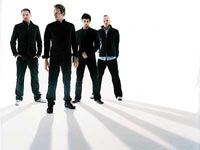|
Coldplay's Chris Martin is one repressed, neurotic pop star. But his angst pays off on X&Y .
By Rob Tannenbaum The juiciest sighting last month at the alternative-rock festival Coachella came Sunday at 7 A.M., only a few hours after Coldplay's headlining set, when Chris Martin walked into the restaurant of his hotel with baby Apple-no nanny or entourage in sight. Letting wife Gwyneth Paltrow sleep in, even though his band sold 10 million copies of their last record, confirmed Martin's reputation for decency: With his last-unironic-man-standing lyrics and firm support for global fair trade, he's like Bono without the messiah complex.
The problem is, a messiah complex is what makes Bono interesting. Intelligent, measured, tidy, lovely, identifiably European, and nearly sexless, Coldplay embodies an ideal of Enlightenment dignity. The band's name gets it backward: Play Cold is more like it. Your level of interest in their music probably correlates with your willingness to be bored. But like yoga or Star Wars , which are also boring, Coldplay's enormous success demands consideration, and on X&Y , their long, long, really long-delayed third album, Martin rewards that curiosity by finally coming into focus.
 X&Y is the work of a neurotic. Whereas most boring music emulates the quiet of Sunday morning (think Norah Jones), Martin songs are narrated from the middle of the night, pacing without leaving his bed. In "What If," he imagines losing all that's important, even his wife and child: "Every step that you take / Could be your biggest mistake," he moans in his beautiful, gray-cloud voice. That's his thesis statement. A worrywart and a fusspot, he deploys a recurring set of images and themes, pitting hope against despair. "How can you know it when you don't even try," he ponders in "What If"; "But if you never try you'll never know," he repeats two songs later; "If you never try then you'll never know," he swoons in "Speed of Sound," the magnificent first single. His lyrics look great at the bottom of e-mail sigs, and if that's not a compliment, it recognizes his gift for a rallying cry; when he sang "Give me real, don't give me fake" on Coldplay's last album, A Rush of Blood to the Head , he summoned everyone who was grousing about Britney Spears. Politicians have been elected on lesser platforms. X&Y is the work of a neurotic. Whereas most boring music emulates the quiet of Sunday morning (think Norah Jones), Martin songs are narrated from the middle of the night, pacing without leaving his bed. In "What If," he imagines losing all that's important, even his wife and child: "Every step that you take / Could be your biggest mistake," he moans in his beautiful, gray-cloud voice. That's his thesis statement. A worrywart and a fusspot, he deploys a recurring set of images and themes, pitting hope against despair. "How can you know it when you don't even try," he ponders in "What If"; "But if you never try you'll never know," he repeats two songs later; "If you never try then you'll never know," he swoons in "Speed of Sound," the magnificent first single. His lyrics look great at the bottom of e-mail sigs, and if that's not a compliment, it recognizes his gift for a rallying cry; when he sang "Give me real, don't give me fake" on Coldplay's last album, A Rush of Blood to the Head , he summoned everyone who was grousing about Britney Spears. Politicians have been elected on lesser platforms.
Martin's obsessed, hounded. So he envisions disastrous skies and murderous seas, glimpses a distant apocalypse with "computers looking for life on earth," longs for order and symmetry, mourns impermanence, and damns puzzles for being, well, puzzling. All the while, the three bandmates no sane person can name supersize their British folk-rock, bolstering St. Paul's Cathedral organs and guitar sounds as big and mysterious as NASA missions with a more modern drum pulse. Liam Gallagher of Oasis, a jerk but also one of culture's last social-class warriors, has said that Martin "looks like a geography teacher," and there's a lot to that insult, aside from a slur on receding hairlines.
Martin's mother was a teacher and his father was an accountant, and they bequeathed him an entirely middle-class faith in communication and logic. When his fears swirl into chaos, Martin longs to talk: Between "Tell me how you feel" in "Talk" and "Say how you feel" in "Twisted Logic," and "You just want somebody listening to what you say" in "Square One," the CD would make a great ad campaign for the American Psychiatric Association.
Except that talking just leads him back to worrying. "Fix You," a pledge of understanding probably inspired by Apple, was previewed weeks ago on The O.C. , which is apt. At 28, Martin is a grown-up adolescent. Compared with Bono, his stated role model, Martin has a narrow emotional range. So while Coldplay gets accused of aping U2's spectacular guitar effects and Radiohead's falsetto peals, the singer's roots go back another twenty years: He's an old-fashioned singer-songwriter who peddles his angst like Jackson Browne mulling his wife's suicide or James Taylor recounting his nervous breakdown.
It couldn't have helped Martin's neuroses that the delays in releasing this record caused a substantial drop in EMI's stock price. But buying on the dip would've been smart. Only one track here is too weak to be a hit, and that's "A Message," an appalling, straight-faced love song. (Don't believe me? It starts, "My song is love," then gets worse.) The record company might still be releasing singles from X&Y when Apple Martin starts college. "Is there anybody out there who / Is lost and hurt and lonely too?," Martin croons in "Square One." And the answer is yes-about 10 million others. |